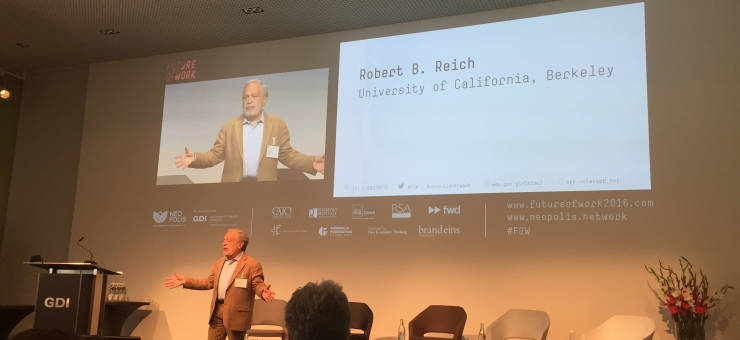Can a Universal Basic Income help to end poverty for good?

Universal Basic Income (UBI) – the idea of a guaranteed household income regardless of whether an individual is in work or not - was the central topic of the recent Future of Work conference in Zurich.
UBI - a concept that has been debated in economic circles for a number of decades - has seen a resurgence in interest of late due to the increasing automation of human work and predictions from the likes of Oxford University that up to half of all jobs could be lost to machines within one or two decades.
The idea is subject to heated debated across political divisions. Switzerland is among the countries discussing the introduction of UBI and will hold a national referendum on it later this year. Trials are already underway in the Netherlands and will begin soon in Finland.
UBI is seen by some as the cure-all solution to a welfare system looking under increasing pressure in the face of technological change and new forms of employment – particularly the number of jobs in the platform/sharing economy which is predicted to rise sharply across the next few years. The question of how welfare systems adapt to an economy in which a worker may hold a number short-term, insecure jobs is central to the argument for a basic monthly income regardless of employment status.
“Everything that can become a platform will become a platform,” says Robin Chase, co-founder of ZipCar, the largest car sharing company in the world. “My father had one job in his lifetime, I will have six jobs in my lifetime, and my daughter will have six jobs at the same time.”
Chase acknowledges that this may not be to everyone’s taste and is backing the idea of a Universal Basic Income in response to the number of workers likely to lose their jobs in the transformation to the platform economy.
For others, including former Greek Finance Minister and renowned economist Yanis Varoufakis, historic levels of economic inequality are justification enough for UBI’s introduction.
“It is a necessity,” Varoufakis says. “It is not a question of whether we like it or not. A basic income is a dividend to a public who are collectively responsible for the production of wealth.”
Former U.S. Labour Secretary Robert Reich points to a labour participation rate at its lowest level in years and the fact that technology is pushing more and more people into low paid work. “We get inequality, an aggregate demand problem and insecurity,” Reich said. “It is worthwhile to think hard about UBI.”
Trade unions are so far divided on the possible benefits of UBI. Former SEIU President Andrew Stern warns of the dangers of failing to prepare for the seemingly inevitable wave of unemployment on the horizon. “In ten to twenty years when the tsunami of destruction comes – the small dykes we have put in place won’t hold it off,” Stern says. “Universal Basic Income is a very different way to approach this problem. No policy I have heard yet can do what UBI can do. We wouldn’t need unemployment insurance. It’s about choices, freedom and opportunity.”
Varoufakis agrees. “When machines pass the Turing test (the ability to be indistinguishable from a human) we will see for the first time in human history the point when job destruction outweighs job creation.”
“Social safety nets are good to catch you but difficult to get out of,” he adds. “Think of a basic income as a foundation to stand on and reach towards the sky.”
Vania Alleva, President of UNIa, Switzerland’s largest union, remains skeptical. “It is a vision that is worthy of discussion,” Alleva says. “But we have a social security system in Switzerland that works. This is being endangered by UBI.”
Andrew Brady of the UK’s Unite the Union is sympathetic to the idea of UBI but says that it should not been seen a silver bullet but viewed as one part of the solution to the new economy unfolding around us. Involving trade unions in its development and administration, linking UBI to reskilling and training, and framing its progress in conjunction with a higher minimum wage and stronger labour laws would ensure better standards and mitigate against economic disruption, Brady said.
Switzerland votes in its Universal Basic Income referendum in June 2016.

